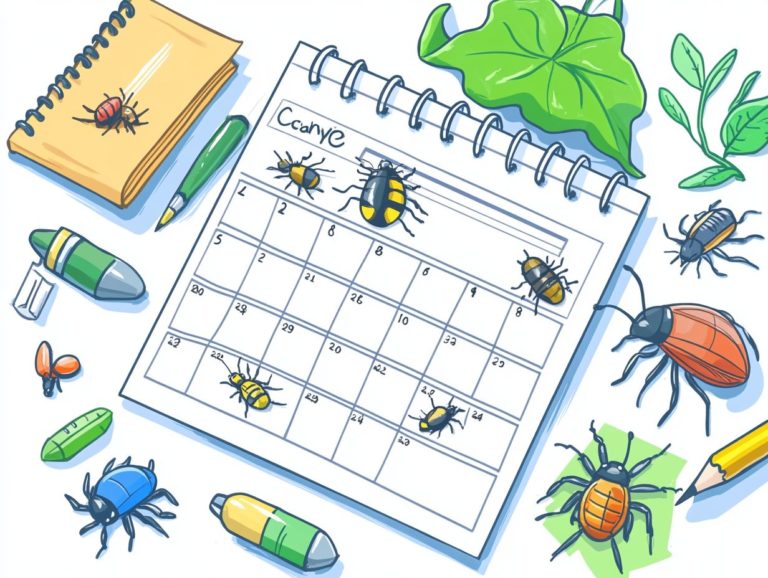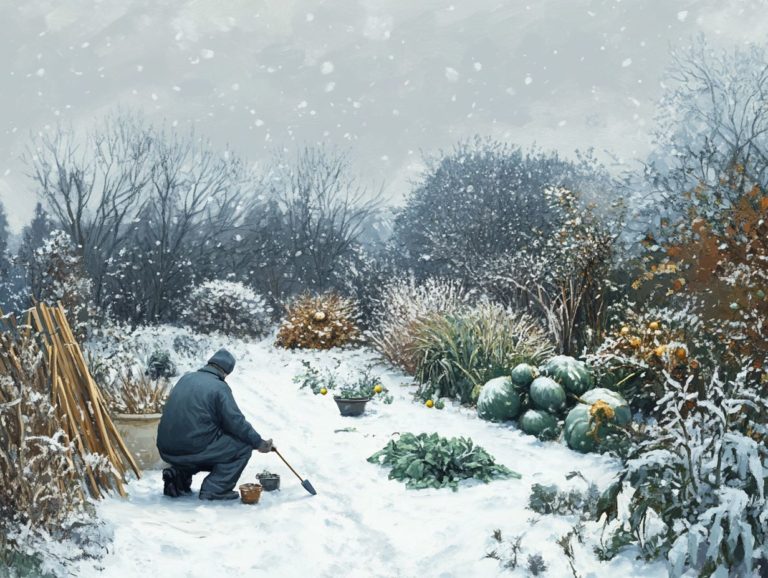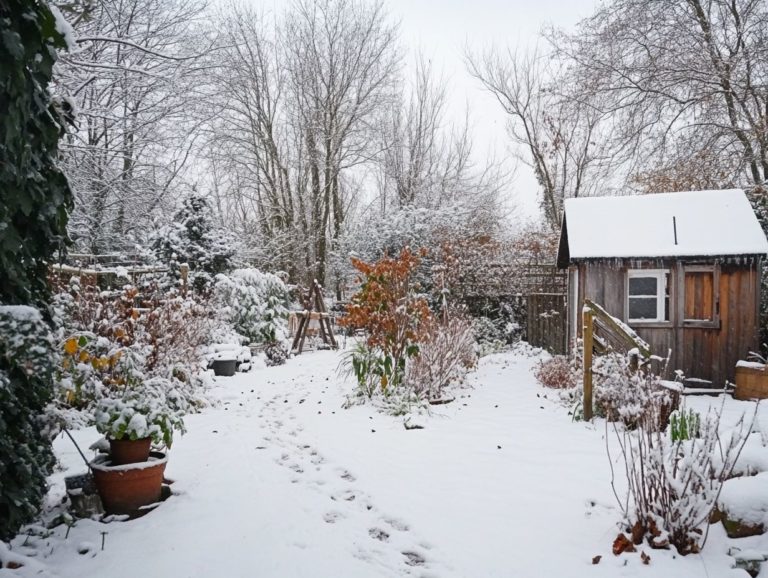5 Benefits of Mulching for Pest Prevention
Mulching beautifies your garden and improves soil health. It s also a powerful ally in your battle against pests, contributing to effective pest control.
Let s explore five essential benefits of mulching, including the advantages of using organic mulch. These benefits range from controlling pest populations to establishing a protective barrier against unwelcome visitors. You ll also discover the best types of mulch to use and how frequently to apply it.
Discover how mulching can change your gardening experience, enhancing both soil health and visual appeal.
Contents
- Key Takeaways:
- 1. Helps Control Pest Population Naturally
- 2. Creates a Barrier Against Pests
- 3. Improves Soil Health
- 4. Reduces the Need for Harmful Pesticides
- 5. Saves Time and Effort in Pest Management
- What Is Mulching and How Does It Work for Pest Prevention?
- What Types of Mulch Are Best for Pest Prevention?
- How Often Should Mulch Be Applied for Optimal Pest Prevention?
- What Are the Other Benefits of Mulching Besides Pest Prevention?
- Are There Any Disadvantages to Using Mulch for Pest Prevention?
- How Can One Incorporate Mulching into Their Pest Prevention Plan?
- Frequently Asked Questions
- What are the benefits of mulching for pest prevention?
- How does mulching create a physical barrier against pests?
- Can mulching improve soil quality to prevent pests?
- How does mulching reduce moisture levels and prevent pests?
- What nutrients can mulch provide to prevent pests?
- Are there any other benefits of mulching for pest prevention?
Key Takeaways:
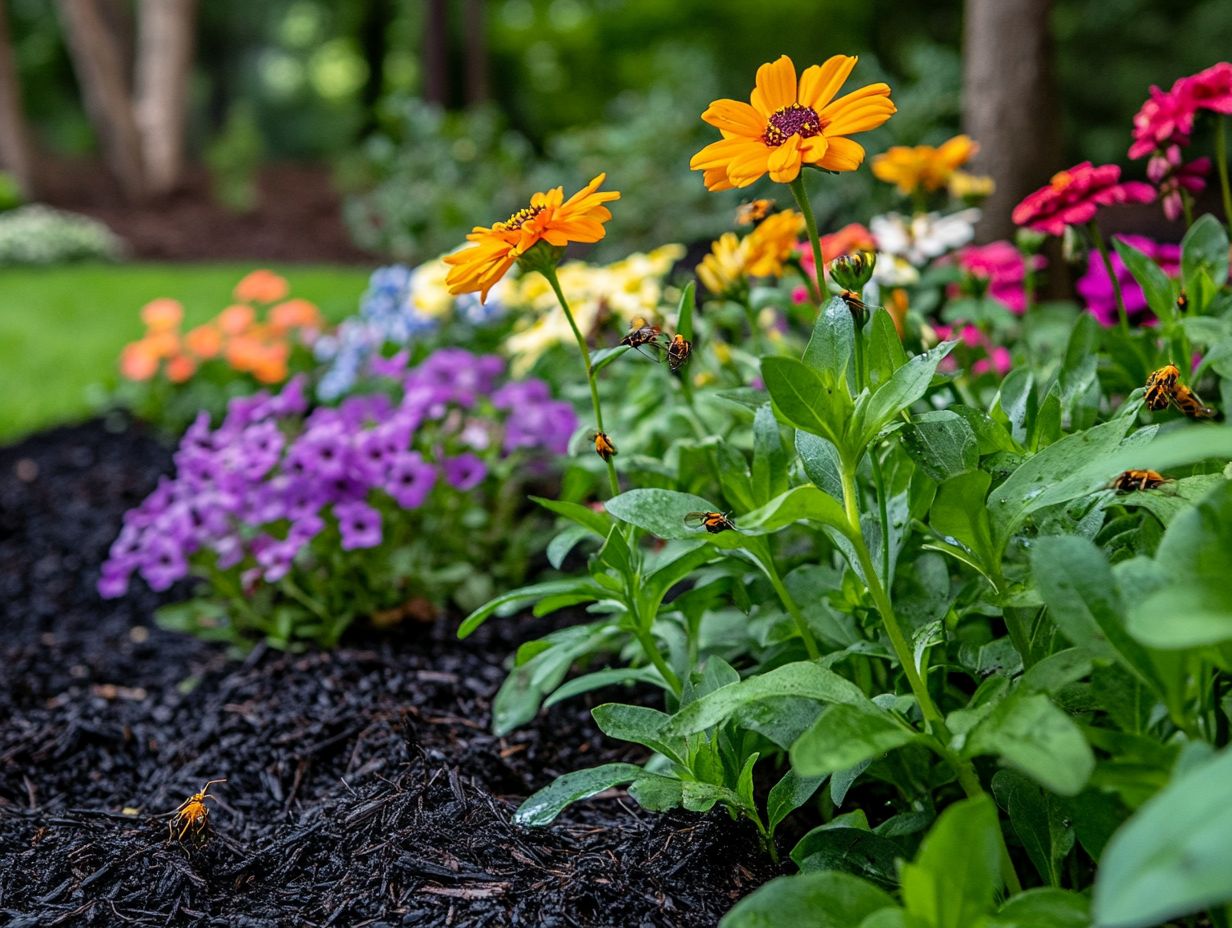
- Using mulch can control pests naturally and safely.
- It creates a barrier to protect your plants while keeping moisture in.
- Mulching boosts soil health by retaining moisture and nutrients.
1. Helps Control Pest Population Naturally
Mulch offers an environmentally friendly solution for managing pest populations. It uses organic materials that enhance soil health and promote a community of plants and animals in your garden.
Consider various types of mulch, such as cedar mulch and bark mulch. They do more than just suppress pests; they enrich the soil structure and fertility. For instance, cedar mulch releases natural oils that deter insects while improving water retention, creating a welcoming environment for beneficial organisms. Bark mulch, in contrast, breaks down slowly, providing long-lasting benefits to your soil.
Both types of mulch support earthworms, enhancing nutrient availability by aerating the soil and breaking down organic matter. This synergy fosters healthy plant growth, resulting in vibrant gardens that thrive naturally.
2. Creates a Barrier Against Pests
By forming a protective barrier, mulch safeguards your garden against pests. It limits their access to vulnerable plants while enhancing the overall aesthetics of your landscaping.
Opt for organic mulch, such as shredded bark, straw, or grass clippings. This not only suppresses weed growth but also enriches the soil as it decomposes. For a more durable option, consider landscape fabric. It blocks light from reaching weeds while allowing water and nutrients to seep through.
Both options deter unwelcome critters, forming a robust shield that protects your plants. Plus, the variety of textures and colors in these mulches adds an appealing visual element, seamlessly blending functionality with beauty.
3. Improves Soil Health
Mulch dramatically transforms soil health by introducing organic matter that enhances moisture retention and boosts soil fertility. This creates a vibrant environment in which both plants and earthworms flourish.
Various types of mulch, from bark chips to straw, offer benefits in nutrient availability. As they break down, they release essential elements back into the soil. This gradual decomposition enriches nutrient availability for nearby plants and fosters beneficial microbial activity.
For those eager to enhance soil conditions, seasonal composting is an effective strategy. By layering compost with mulch, especially in the spring and fall, you can significantly boost microbial diversity and improve soil structure. This approach leads to healthier plants and increased yields over time.
Start mulching today to see the difference!
4. Reduces the Need for Harmful Pesticides
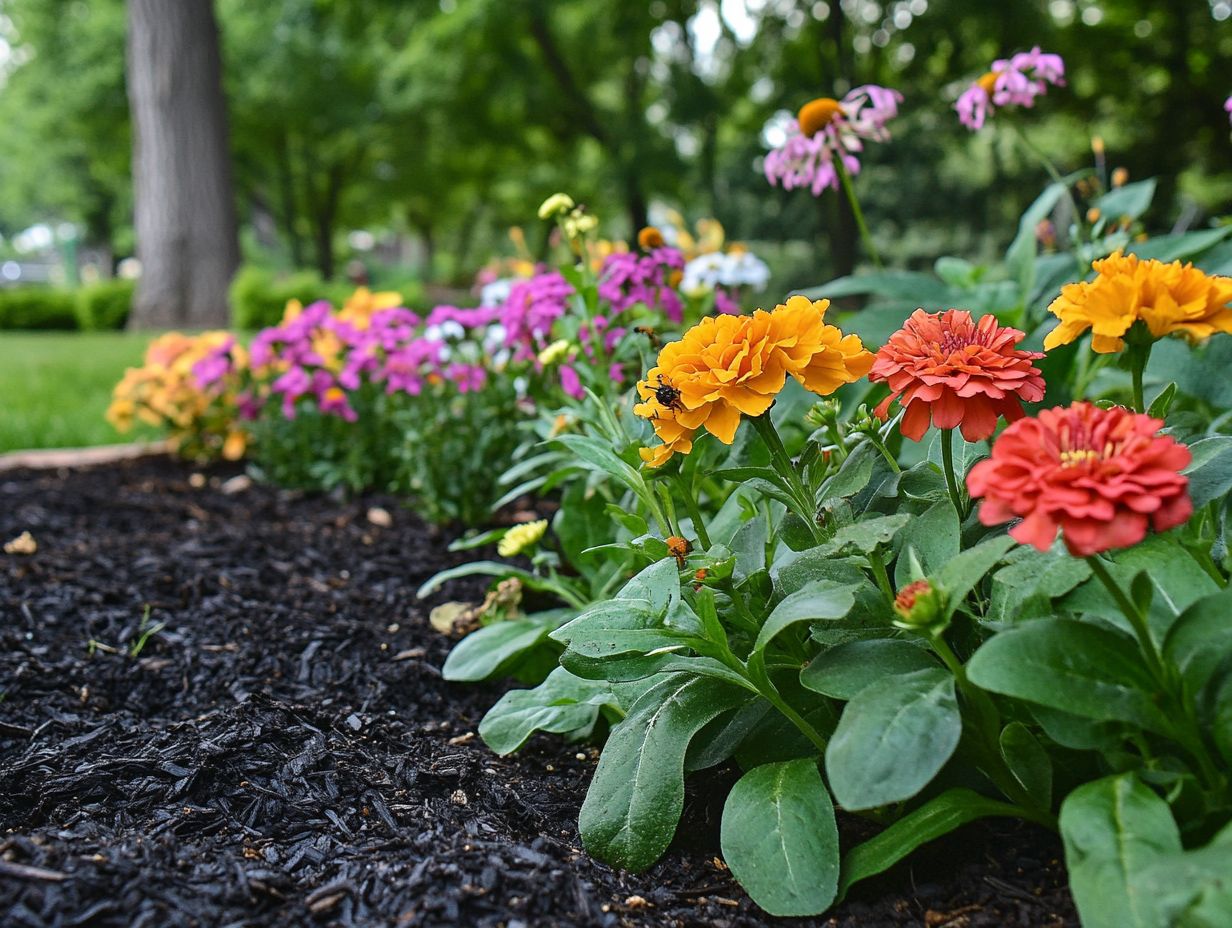
Utilizing organic mulch promotes the health of your plants and soil. It also drastically reduces the need for harmful pesticides, making it an environmentally conscious choice for effective pest control.
By creating a barrier that keeps pests at bay, mulch serves as a natural deterrent against various garden nuisances. These dense layers block sunlight, inhibiting the growth of weeds the pesky plants that often invite unwanted insects into your garden.
Choosing non-toxic methods like organic mulch supports sustainable gardening practices. It enriches the soil while nurturing a balanced ecosystem. This approach protects beneficial organisms, such as pollinators and soil microbes tiny organisms in the soil that help plants grow while minimizing chemical runoff, which are chemicals that wash away into water, harming local waterways.
In this way, you can cultivate vibrant blooms and bountiful yields without compromising the integrity of the environment!
5. Saves Time and Effort in Pest Management
Incorporating mulch into your gardening routine can significantly save you time and effort in pest management. This ensures a low-maintenance landscape while enhancing your garden’s overall health.
Creating a protective barrier over the soil helps retain moisture and suppresses weed growth. This reduces competition for vital nutrients. For optimal results, apply mulch in early spring as you prepare your soil for growing plants. Apply it again in autumn to shield the roots from winter chills and temperature fluctuations.
These strategic timings also work wonders in detering pests. A thick layer of mulch disrupts their habitat, making your garden a less inviting place for them to settle. By regularly maintaining this layer throughout the year, you ll cultivate a thriving and manageable garden environment!
What Is Mulching and How Does It Work for Pest Prevention?
Mulching is an essential practice where you apply a layer of organic or inorganic materials to the soil surface. This technique plays a pivotal role in pest prevention by creating an unwelcoming environment for pests, enhancing moisture retention, and improving overall soil health in your landscaping projects.
As a barrier, mulch protects the soil from temperature fluctuations and curbs weed growth, which can attract unwanted insects. You can choose from a range of mulch types, including organic options like bark chips, grass clippings, and straw, as well as inorganic materials such as gravel and landscape fabric.
Each type of mulch offers its unique set of benefits for effective pest control and soil health. For instance, organic mulches break down over time, enriching the soil with essential nutrients. In contrast, inorganic mulches often have a longer lifespan and require less upkeep, making them an excellent choice for long-term gardening plans.
Understanding the role of each type in pest deterrence can significantly elevate your gardening efforts. This ultimately leads to more fruitful outcomes!
What Types of Mulch Are Best for Pest Prevention?
When choosing mulch for pest prevention, consider organic varieties like cedar mulch and bark mulch. These not only keep pests at bay but also enrich your soil as they break down.
These organic materials gradually release beneficial nutrients, promoting a vibrant ecosystem while sending pesky insects like slugs and termites packing. Inorganic mulches such as gravel or rubber may not boost soil health, but they can still serve as a barrier against certain pests.
The scent of cedar mulch naturally repels insects because many find its aromatic oils off-putting. By blending both organic and inorganic options, you can craft a robust defense system that enhances pest control while nurturing your soil throughout the growing season. Start using organic mulch today for a healthier garden!
How Often Should Mulch Be Applied for Optimal Pest Prevention?
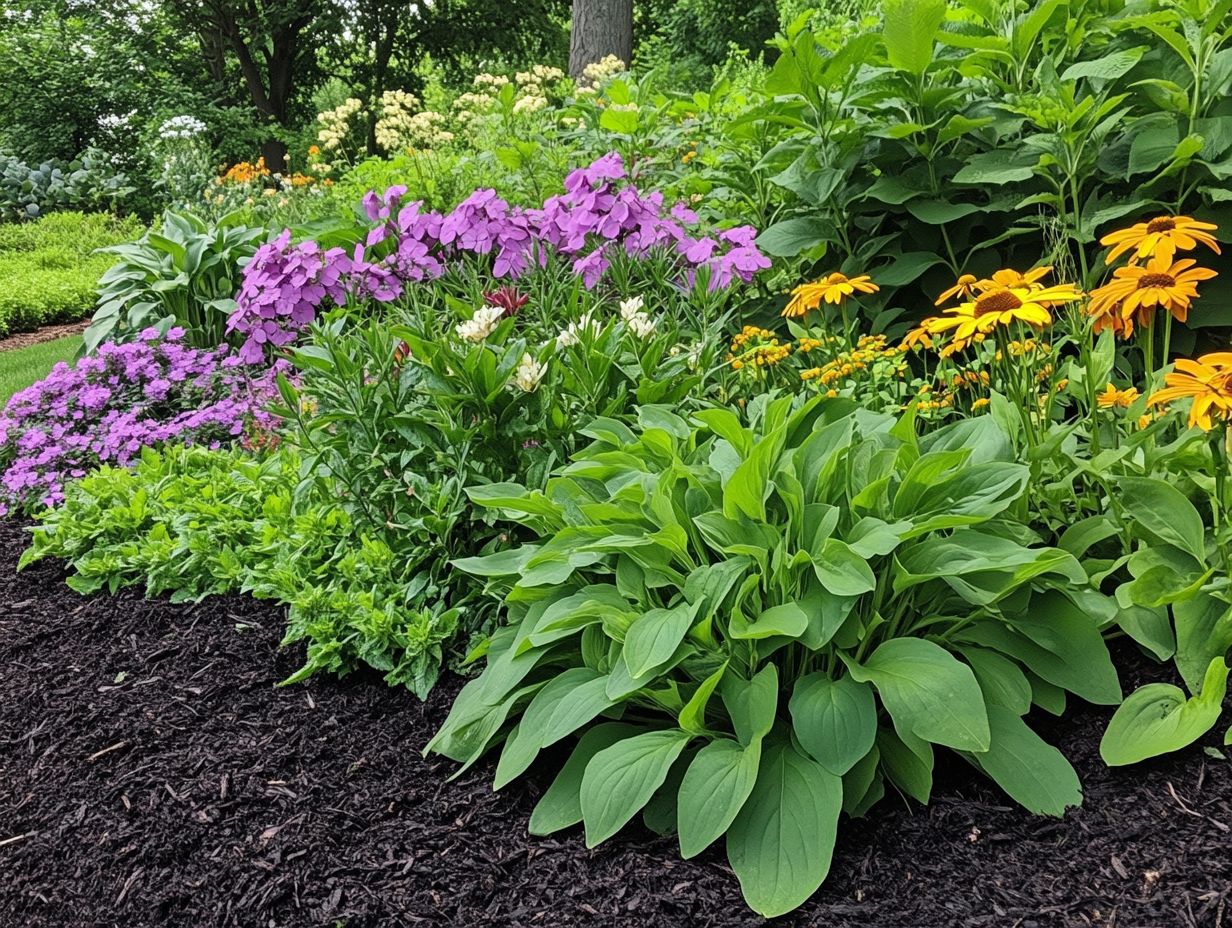
For optimal pest prevention, you should refresh or reapply mulch annually or biannually based on the type of mulch you re using and the moisture levels in your garden.
In addition to the right mulch application frequency, consider the timing and type of mulch you choose to ensure its effectiveness throughout the seasons. During winter, a thicker layer of mulch can insulate the soil and protect your plant roots from extreme cold. As spring arrives, a more modest layer promotes better moisture retention and nutrient absorption as your plants start to emerge.
To achieve that perfect mulch layer, aim for a depth of about two to four inches, while ensuring it doesn’t touch the stems of your plants to prevent rot. Regularly checking and adjusting the mulch not only supports plant health but can also effectively deter pest issues.
What Are the Other Benefits of Mulching Besides Pest Prevention?
Along with pest prevention, mulching offers a wealth of benefits, including enhanced soil health, moisture retention, erosion control, and enhanced aesthetic appeal for your landscape.
These advantages create an environment where your plants can truly flourish. Improved soil health is vital for nurturing beneficial microorganisms, boosting nutrient availability. Moisture retention helps maintain consistent hydration, allowing roots to absorb water effectively and reducing the need for frequent watering.
Erosion prevention protects your soil structure against heavy rain or wind, ensuring that nutrients remain in place critical for robust plant growth.
A well-mulched garden looks great and enhances the overall appearance of your outdoor space. It also adds a layer of functional beauty that complements any landscaping design.
Are There Any Disadvantages to Using Mulch for Pest Prevention?
While mulch can provide numerous benefits for pest prevention, it’s crucial to understand some potential drawbacks, such as specific types of mulch that might attract unwanted pests and the necessity for ongoing maintenance.
Certain organic mulches, like wood chips or straw, may inadvertently draw in insects and rodents, upsetting the balance in your garden. If left unchecked, mulch can create a welcoming environment for weeds, making it more challenging to maintain a tidy garden space.
To counter these disadvantages, select your mulch types carefully. For example, opting for cedar or cypress mulch can be advantageous, as their natural oils tend to repel pests.
By keeping a close eye on your mulch layer and refreshing it as necessary, you can manage its thickness, minimizing the chances of pest attraction and weed proliferation.
How Can One Incorporate Mulching into Their Pest Prevention Plan?
Incorporating mulching into your pest prevention strategy requires a thoughtful approach. You’ll want to carefully choose the right types of mulch and apply them with precision.
Using organic materials like wood chips, straw, or grass clippings enriches your soil and helps deter harmful pests. Adjust both the thickness and type of mulch according to the seasons; for example, a thicker layer in winter can safeguard roots from frost, while a thinner layer in spring promotes moisture retention and attracts beneficial insects.
By regularly monitoring the health of your mulch and ensuring it stays pest-free, you ll significantly enhance its effectiveness within your garden ecosystem.
Frequently Asked Questions
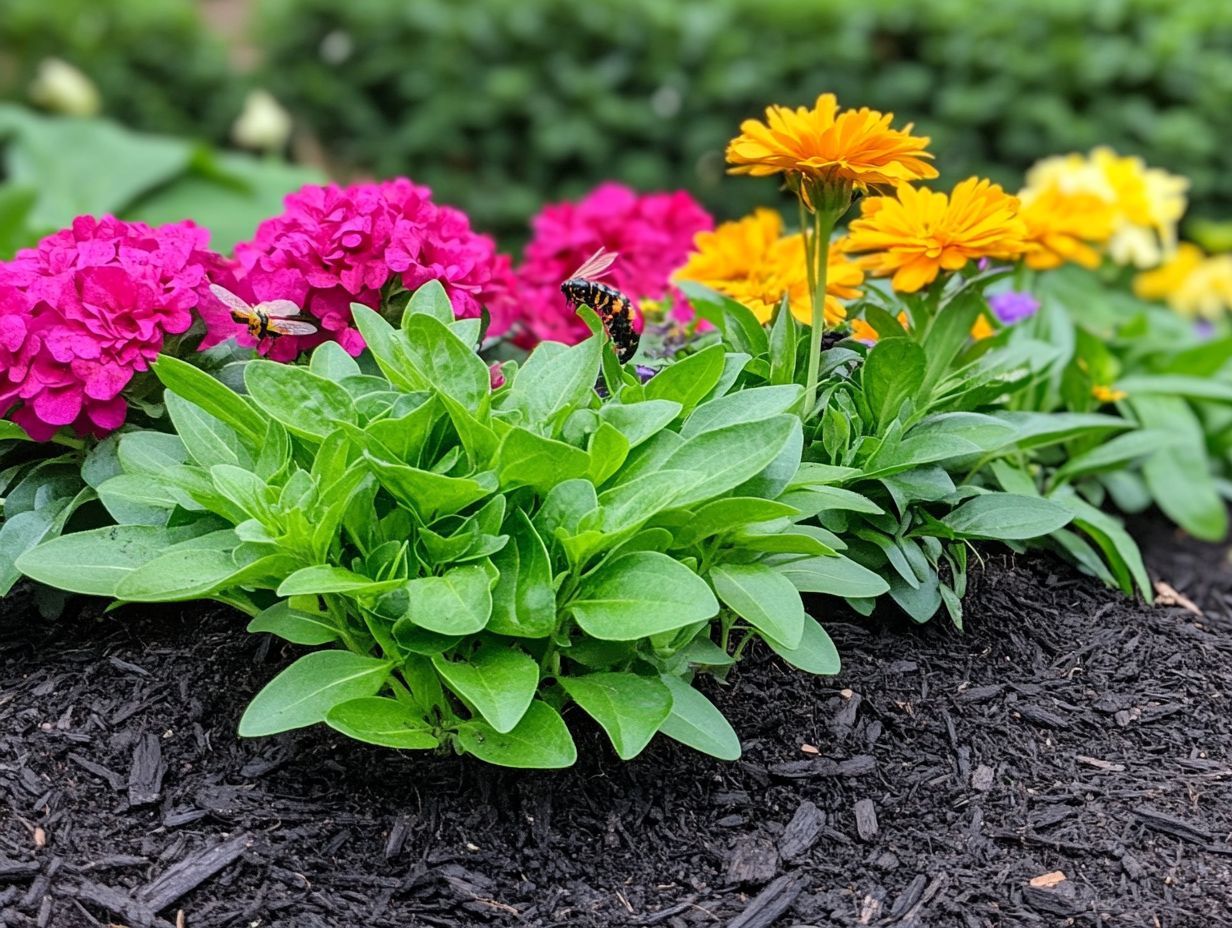
What are the benefits of mulching for pest prevention?
Mulching offers several benefits for pest prevention. It creates a barrier that keeps pests away from plants, but incorporating crop rotation for pest control can enhance your gardening strategy even further.
It improves soil quality, promoting plant health and boosting resistance to pests. A well-mulched garden can also attract helpful insects that prey on pests.
How does mulching create a physical barrier against pests?
Applying mulch around plants creates a barrier that pests find hard to cross. This prevents them from feeding on or laying eggs in the soil.
Can mulching improve soil quality to prevent pests?
Yes, mulching enhances soil quality in several ways. It adds organic matter, supporting a diverse microbiome that helps control pests.
How does mulching reduce moisture levels and prevent pests?
Mulch regulates moisture levels by creating a barrier between soil and air. This prevents excessive moisture that attracts pests like slugs and snails.
Mulch also retains moisture during dry spells, keeping plants healthy and less vulnerable to pests.
What nutrients can mulch provide to prevent pests?
Types of mulch, such as compost, provide essential nutrients to the soil. This helps plants grow strong and healthy, reducing their vulnerability to infestations.
Nutrient-rich mulch also attracts beneficial insects that naturally control pests.
Are there any other benefits of mulching for pest prevention?
Besides pest prevention, mulching controls weed growth. Weeds compete for nutrients and can attract pests.
It also regulates soil temperature, making conditions less favorable for pests. Overall, mulching supports a thriving garden while preventing pests.

